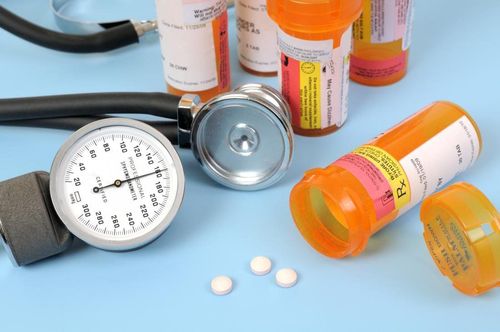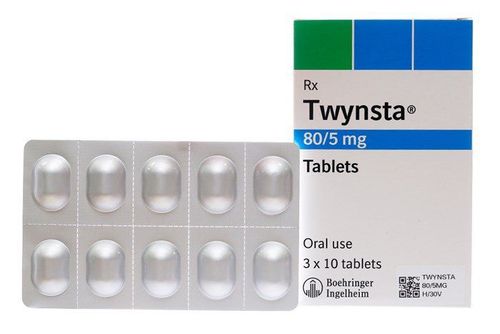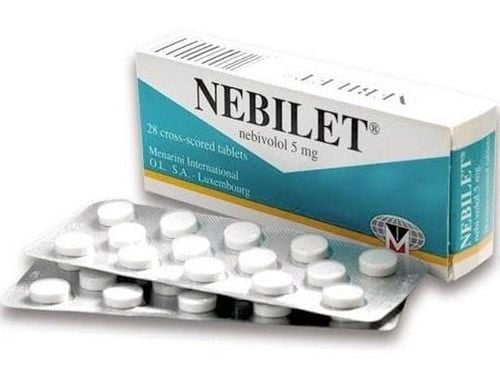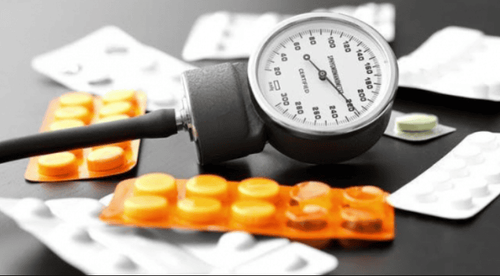This is an automatically translated article.
Esseil is made in the form of film-coated tablets, with the main ingredient being Cilnidipine. The drug is indicated for use in the treatment of hypertension. To ensure effective use and avoid unwanted side effects, patients need to take the drug exactly as directed by the doctor or pharmacist.
1. Uses of Esseil
Esseil drug is made in the form of tablets, there are strength forms of Esseil 10 and Esseil-5. What is Esseil-10? The main ingredient of the drug is Cilnidipine 10mg. In terms of pharmacodynamics, this ingredient has antihypertensive effect; regulation of cerebral blood flow; does not affect heart rate; increased urine volume, renal blood flow and glomerular filtration rate; prevent heart enlargement, prevent stroke, reduce atherosclerotic index,...
Indications for using Esseil: Used to treat hypertension.
Contraindications to the use of Esseil:
Patients with hypersensitivity to Cilnidipine or its components; Women who are pregnant or likely to become pregnant.
2. Usage and dosage of Esseil
How to use: The patient takes the drug orally. Esseil tablets should be swallowed whole, without chewing, crushing or breaking them before taking them. The drug should be taken after breakfast. Patients must absolutely not stop taking the drug suddenly, but must reduce the dose gradually with strict control to prevent the risk of worsening of the condition. In addition to taking medication, to control blood pressure well, patients should build a scientific and reasonable diet.
Dosage:
For adults: The usual dose is 5 - 10mg Cilnidipine orally x 1 time/day after breakfast. Dosage may be adjusted according to the age and symptoms of the patient. The dose can be increased to 20mg/time/day if there is insufficient response to the drug; For people with severe hypertension: Take a dose of 10-20mg orally x 1 time/day after breakfast. Overdose: An overdose of Cilnidipine can cause an excessive drop in blood pressure. To manage, if blood pressure drops markedly, it is necessary to carry out appropriate measures such as raising the lower extremities, administering fluids, using antihypertensive drugs.
Missed dose: In case of forgetting to take Esseil, the patient should take it as soon as he remembers. If it is almost time for the next dose, skip the missed dose and take the next dose as scheduled.
3. Side effects of Esseil
When using Esseil, patients may experience some side effects such as:
Liver dysfunction and jaundice, accompanied by increased AST (GOT), ALT (GPT) and γ-GTP; Thrombocytopenia; Kidney: Increased creatinine or urea nitrogen, positive proteinuria, sediment in the urine,...; Neuropsychiatric: Headache, dizziness, shoulder stiffness, drowsiness, insomnia, forgetfulness, trembling fingers, numbness; Cardiovascular: Flushing, palpitations, sensation of heat, decreased blood pressure, abnormal electrocardiogram, chest pain, tachycardia, increased heart-to-chest ratio, atrioventricular block, cold sensation, extrasystole ; Gastrointestinal: Nausea, vomiting, abdominal pain, constipation, abdominal distension, thirst, heartburn, diarrhea, enlarged gums; Hypersensitivity: Rash, redness, itching of the skin, photosensitivity; Hematology: Increased or decreased white blood cells, neutrophils and hemoglobin; increased or decreased red blood cells, eosinophils, hematocrit and lymphocytes; Other Adverse Reactions: Edema (face or lower extremities), urinary urgency, generalized malaise, serum cholesterol elevation, CK elevation or decrease, potassium, uric acid and serum phosphorus, periocular dryness, ocular congestion and sensation irritation, increased or decreased fasting blood sugar, positive urinary tract, etc. Should be observed if the patient shows any abnormal signs, appropriate measures should be taken, such as discontinuing the drug. Essiel . At the same time, should immediately inform the doctor about the side effects encountered when taking the drug.
4. Be careful when using Esseil
Before and while taking Esseil, patients should note:
Use with caution in patients with severe liver dysfunction, people with a history of serious adverse reactions to calcium antagonists, elderly people ; There have been reports of side effects when using castor oil and the drug Esseil. Side effects include nausea, abdominal pain, vomiting, and diarrhea. Therefore, castor oil-containing medicines should not be used in cases of patients with intestinal obstruction or narrowing, atony (loss of normal peristalsis in intestinal muscles), colitis, appendicitis, unexplained abdominal pain. cause, severe dehydration; Do not use Esseil in pregnant women, women of childbearing potential and nursing mothers; There have been reports of abrupt discontinuation of calcium antagonists resulting in exacerbation of some symptoms. Therefore, if it is necessary to stop taking the drug, the patient should be gradually reduced the dose under the close supervision of the physician. If Cilnidipine is discontinued from a dose of 5 mg/day, appropriate measures such as substitution with another antihypertensive drug should be instituted (as directed by the physician); When using cilnidipine in the elderly, caution should be exercised under close supervision, taking measures such as using a lower starting dose (e.g. a dose of 5 mg) to avoid excessive hypotensive effects in the elderly. old. The safety of the use of Cilnidipine in children has not been established; Symptoms such as dizziness may occur due to the blood pressure lowering effect of Esseil. Therefore, patients should be cautious when taking drugs and must perform activities that require alertness such as: Driving, operating machinery, working at height, ...
5. Esseil drug interactions
Cilnidipine is mainly metabolised by the enzyme CYP3A4 and partly by CYP2C19. Some drug interactions of Esseil include:
Other antihypertensive drugs: May cause blood pressure to drop excessively due to additive or synergistic effects; Digoxin: There have been cases of calcium antagonists increasing the plasma concentration of digoxin. If signs of digoxin-related toxicity such as nausea, vomiting, arrhythmia, abnormal vision, etc., are observed, appropriate interventions such as digoxin dose adjustment or discontinuation of Cilnidipine should be instituted. depending on the patient's condition; Cimetidine: There have been cases where the effect of calcium antagonists has been increased when co-administered with cimetidine. This is because Cimetidine reduces blood flow through the liver, blocking the metabolism of calcium antagonists by liver microsomal enzymes. Besides, Cimetidine reduces the amount of stomach acid, so it increases the absorption of calcium antagonists; Rifampicin: There have been cases where the effect of calcium antagonists has been reduced when co-administered with Rifampicin. It is caused by the hepatic drug-metabolizing enzyme induced by rifampicin, which promotes the metabolism of these drugs; Antifungal azoles (itraconazole, miconazole): May increase blood levels of Cilnidipine. The reason is that the azole antifungal group inhibits CYP 3A4 - the enzyme that metabolizes the drug Cilnidipine; Grapefruit juice: May increase blood levels of Cilnidipine. The reason is that some components in grapefruit juice can inhibit CYP 3A4 - the enzyme that metabolizes Cilnidipine. Esseil is a prescription medication used to treat many cases of high blood pressure, including essential hypertension. When taking the drug, the patient should strictly follow all the instructions of the doctor.
Follow Vinmec International General Hospital website to get more health, nutrition and beauty information to protect the health of yourself and your loved ones in your family.
Please dial HOTLINE for more information or register for an appointment HERE. Download MyVinmec app to make appointments faster and to manage your bookings easily.













